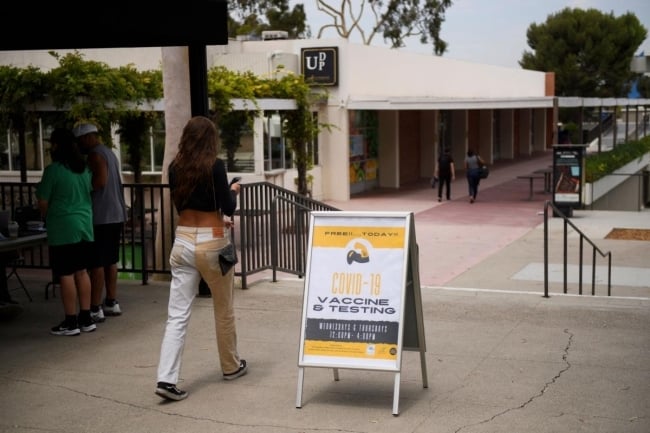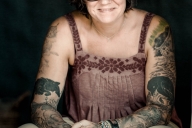You have /5 articles left.
Sign up for a free account or log in.

A COVID-19 vaccination clinic at California State University, Long Beach. Research shows that only about 7.4 percent of colleges still require all students be vaccinated against COVID-19.
Patrick T. Fallon/AFP/Getty Images
Going into the 2021-2022 academic year, hundreds of U.S. colleges and universities mandated the COVID-19 vaccine for students, which had been released the previous December and gradually become accessible to the public.
Two years later, few institutions still have a vaccine requirement in place. According to a recent American College Health Association survey of 311 institutions, only 7.4 percent continue to mandate vaccines for all students. Another 10.7 percent require that some subgroup, such as residential students, be vaccinated against the coronavirus.
Along similar lines, No College Mandates, an advocacy group that argues against COVID-19 vaccine requirements, counts 93 colleges that continue to maintain some sort of requirement, or 7.7 percent of the 1,211 institutions whose policies they evaluated. Those policies run the gamut from requiring students to have a “primary” vaccine—meaning either one Johnson & Johnson shot or a two-shot series of an mRNA vaccine, like the Pfizer-BioNTech shot—to mandating the bivalent booster shot, which helps protect against both the original strain of COVID-19 and a later variant.
Goucher College, a liberal arts college of about 2,000 students located in Towson, Maryland, is in the former category. Students are required to have at least one COVID-19 vaccination to attend, although employees are not required to be vaccinated against the virus at all.
“Our campus is a residential campus, and we have a long history of requiring certain vaccinations to ensure we do everything we can to protect the health and wellbeing of our student population,” said Jean Perez, Goucher's director of student health and wellness. “It’s something small we can do that could have a big impact on public health.”
Last year, the college had more stringent requirements, mandating students have the bivalent booster based on the Centers for Disease Control and Prevention guidance. But recently, the institution simplified things by necessitating only the original vaccine.
Goucher also maintains an isolation policy that requires students living on campus who come down with COVID-19 to either recover at home or stay in on-campus isolation housing. Only a small number of colleges continue to provide student isolation housing, according to the ACHA survey; 11.4 percent of respondents offer it to the student who is sick, while 3.6 percent offer it to a sick student’s roommates. Another 12.3 percent offer it only to an infected student’s roommate if they are “at high risk of getting very sick from COVID-19.”
According to the ACHA survey, the most common solution is also the most rudimentary: 38 percent of institutions ask students sick with COVID-19 to isolate in their dorms, and give roommates the option to find temporary housing at their own expense.
“Every college has such a different set of circumstances and so we’re not surprised campuses are still taking a really wide variety of approaches to managing COVID,” said Claudia Trevor-Wright, project director for ACHA’s Campus COVID-19 Vaccine (CoVAC) Initiative.
Still, she noted that protections are especially important now, as colleges approach the upcoming fall semester with “far fewer resources for data collection and tracking COVID in the community, fewer or no options for free COVID testing.
Several campuses are still offering some COVID-19-prevention resources that have become harder to access elsewhere. A quarter of colleges in the ACHA survey said they recommend students wear masks in the health center and will provide masks for free; a slightly smaller number, 17.7 percent, made the same recommendation for their counseling centers. Nearly three-quarters of campuses will offer some form of on-site testing. Of the institutions that offer rapid testing, 67.1 said those tests were free.
Many students will still be able to receive vaccinations on their campus as well, with over half of the respondents saying jabs would be available on campus, either through the health center or a third-party supplier, such as a local pharmacy.
Where Requirements Remain
Many of the colleges that still have vaccine mandates in place look a lot like Goucher: small, private liberal arts institutions, often in Democrat-led states.
“Public institutions are subject to their state’s directives. Private institutions have quite a bit more flexibility in how they structure their space. Where there is flexibility, you will see a reflection of the community’s value and ethos,” said Trevor-Wright, noting at least one campus that had maintained its mandate because students and other community members had pushed for it.
But not all institutions that require vaccines are small or private; Montclair State University, a public research university in New Jersey with over 21,000 students, maintains a vaccine mandate, as does Rutgers University, the state’s public flagship.
Montclair State requires all students who live on campus to have received a primary vaccination series. Rutgers mandates all students have at least a primary dose; it used to require boosters, but now only health care and safety personnel have to get the extra dose.
Andrew Mees, a spokesman for Montclair State, said that even though Montclair doesn’t look like Goucher, it has still been relatively easy to uphold the public safety measures it feels are best for its students.
“All institutions faced similar challenges during the pandemic, regardless of whether they were public or private institutions. Montclair’s identity and mission is to be a Public Serving University. We are a federally designated Hispanic-Serving Institution, and the majority of our student body are from first-generation and underrepresented minority groups,” Mees wrote in an email. “The pandemic’s effects were not distributed evenly in our population. We know that lower-income people and people of color were disproportionately affected. That is why we have done everything possible to help our students be academically successful during and after the pandemic.”
Like many universities, Montclair State faced backlash to its initial mandate, with one student starting a petition that gained over 2,000 signatures, requesting that the institution roll back the requirement. At the time, many opponents of the mandates argued that the vaccine, which at first was only authorized for emergency use, meant that it was too experimental to require.
Circumstances are different nowadays; several inoculations for COVID-19 have been fully authorized by the Food and Drug Administration, most colleges have returned to in-person learning and fears about the pandemic have largely waned—although cases in many states are currently trending upwards.
According to Mees, there has been no backlash to Montclair State continuing its vaccine mandate into the 2023-2024 academic year. Perez, too, said she wasn’t aware of Goucher facing any backlash.
But opponents such as No College Mandates are still fighting the requirements. Some of their members argue that potential side effects—such as an increased risk of the heart condition myocarditis—are too dire to warrant vaccine mandates. (Risk of myocarditis is higher for people who have contracted COVID than for people who have received the vaccine, researchers have found.)
“Serious side effects that could cause a long-term health problem are extremely rare following any vaccination, including COVID-19 vaccination,” according to the CDC. “The benefits of COVID-19 vaccination outweigh the known and potential risks.”








